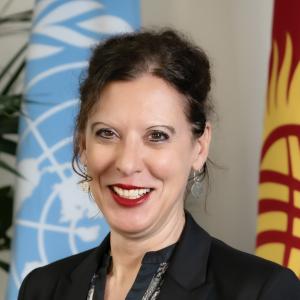Dear First Deputy Minister Azamat Mambetov,
Excellencies,
Dear Colleagues and Partners,
Ladies and Gentlemen,
It is a great honor to open this important international conference today which has been in the making for some time upon the request of the Ministry of Emergency Situations last year, when the country was in the midst of addressing mudflows and other disasters. This conference is, therefore, the result of collaborative efforts of the Ministry of Emergency Situations and the UN system. I would like to express my special appreciation to UNDP and WFP for their financial and technical leadership in organizing this important gathering on behalf of the UN system, testimony to the role both agencies play in supporting the Government in developing and implementing innovative approaches to early warning and disaster risk reduction, in concert with sister UN agencies and other development partners. A special thank you to Ms. Alexandra Solovieva, UNDP Resident Representative, and Mr. Kojiro Nakai, WFP Country Director for their leadership.
We are convening at a time when the climate crisis is escalating, accompanied by a rise in disasters. President Sadyr Japarov raised these concerns repeatedly, including during the 2024 UN General Assembly and at COP 29 in Baku, noting the acceleration of glacier melt, depletion of water resources, and rising disaster risks in mountain ecosystems. These impacts are already evident here in Kyrgyzstan, where heavy rains in 2024 caused destructive mudslides and floods, resulting in the tragic loss of lives and placed immense strains on affected communities and vulnerable groups.
I commend the Government’s proactive efforts to build national systems for monitoring, forecasting, and early warning. These are vital for saving lives, protecting livelihoods, and are cost-effective. Studies show that just 24 hours' notice of a hazardous event can reduce damages by 30 percent. Globally, an US$800 million investment in multi-hazard early warning systems could prevent annual losses of up to US$16 billion.
The UN system is scaling up action through the Early Warnings for All initiative, launched by the Secretary-General at COP27. Co-led by WMO and UNDRR, and supported by numerous Agencies, this initiative aims to ensure every person on Earth is protected by early warning systems by 2027. In 2024, a global Call to Action on Extreme Heat was also launched, promoting science-based resilience.
I encourage the Government to consider joining this initiative. It offers access to global expertise and technical support to help protect the most vulnerable and it supports national efforts to meet global commitments under the Sendai Framework, the Paris Agreement, and the SDGs. As a first step, we propose organizing a workshop bringing together Government-designated leads to initiate the preparation of a national Early Warnings for All roadmap.
Dear participants,
The UN system in Kyrgyzstan is proud to support already these days the country’s implementation of the Sendai Framework, the global blueprint to prevent and reduce disaster risk and losses by 2030. In 2024 alone, joint efforts by UN agencies including FAO, UNDP, UNICEF, WFP, WHO, UNECE, UNFPA, and others resulted in:
- Development of climate risk profiles in eight districts;
- Upgrades to early warning systems;
- Simulation drills reaching nearly one million schoolchildren, including children with disabilities;
- Enhanced protection infrastructure and improved food stock preparedness;
- Strengthened digital disease surveillance and health security;
- Improved emergency response capacity for gender-based violence.
Let me highlight also two notable innovations. First, UNDP introduced a centralized AI system that monitors and forecasts flood risks using satellite imagery and gender-responsive algorithms. This system enabled the safe evacuation of 490 people in Ton District two weeks ahead of a potential lake outburst. Second, WFP piloted weather-based insurance and anticipatory action systems, including a partnership in Naryn where fodder was pre-positioned for pastoralists—triggered by climate forecasts and backed by a revolving fund. In addition, tools such as the PRISM platform and localized INFORM methodology are helping the Ministry of Emergency Situations and local authorities make informed decisions and build a more shock-responsive and well-funded civil protection system.
Kyrgyzstan is also leading regionally. On 21–22 May, Bishkek will host the launch of a UNECE-UNESCAP project to strengthen climate risk governance for tailings management in Central Asia. The project, running through 2028, will support integrated risk maps and early warning systems for industrial and climate hazards in Kyrgyzstan and Tajikistan—fostering transboundary cooperation. Such regional collaboration is crucial, especially given Central Asia’s shared ecosystems and transboundary rivers. The 2023 high-level conference in Bishkek on early warning systems, led by UNDP, marked an important step toward further regional cooperation for climate-resilient development.
To succeed, however, we must invest in technology—GIS, remote sensing, satellite communication, and climate data systems. We must close information gaps, enhance real-time monitoring, and ensure data is accessible and actionable at all levels.
However, no one actor can achieve this alone. Strengthening the system of monitoring and forecasting disasters requires strong collaboration, financing, and technology transfer. We call on donors, the private sector, and development partners to mobilize support. Public-private partnerships can also play a transformative role.
Dear participants,
As emphasized in the Pact for the Future, adopted by world leaders including President Japarov in 2024, science and evidence must guide our policies and investments. We must define clear strategies for a robust national system of monitoring, forecasting, and early warning—not only for mudflows and landslides but for all hazards. The UN system in Kyrgyzstan, along with its partners, remains ready to support the Government and people of the Kyrgyz Republic in this vital work.
I wish you all a very productive conference and look forward to the outcomes!
Thank you.



